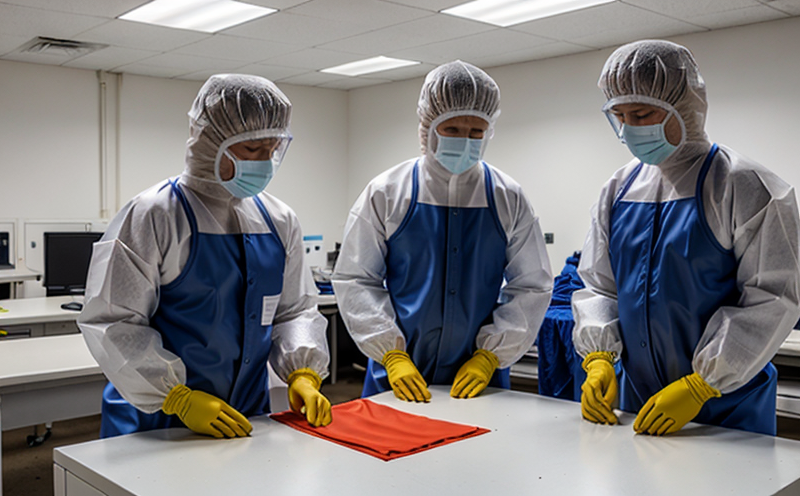EN 1149 Protective Clothing Electrostatic Properties Testing
The EN 1149 standard is specifically designed to ensure that protective clothing used in potentially hazardous environments meets stringent electrostatic properties requirements. This service focuses on testing the electrostatic behavior of textiles, which plays a critical role in preventing static electricity from becoming a source of ignition or causing discomfort in occupational settings.
The tests under EN 1149 are crucial for industries such as manufacturing, chemical processing, and pharmaceuticals where workers may come into contact with flammable materials. Electrostatic discharge (ESD) can lead to fires, explosions, or even serious burns if not controlled properly. By ensuring that protective clothing complies with the standards set forth in EN 1149, we provide a safeguard against such risks.
The testing process involves several stages aimed at evaluating various aspects of electrostatic properties including charge generation and dissipation rates, as well as resistance to static electricity. Samples are typically prepared by cutting from the actual protective clothing used in the workplace. This ensures that the test results accurately reflect how the product will perform under real-world conditions.
For this service, we employ specialized equipment capable of simulating field conditions closely related to those encountered during use. Our state-of-the-art facilities include high-voltage generators and measurement instruments designed specifically for measuring electrostatic properties. Once collected, samples undergo rigorous analysis using these advanced tools before being evaluated against the criteria outlined in EN 1149.
The results of this testing provide critical insights into whether protective clothing meets or exceeds industry expectations regarding its ability to manage static electricity safely and effectively. Compliance with these standards not only enhances worker safety but also helps organizations meet regulatory requirements while maintaining a competitive edge within their respective sectors.
Our expertise lies in providing comprehensive support throughout the entire process, from initial consultation through final report delivery. We work closely with clients to understand specific needs and ensure that all tests conducted align perfectly with both international standards and internal quality control goals.
In summary, EN 1149 Protective Clothing Electrostatic Properties Testing is essential for ensuring worker safety in environments where electrostatic discharge could pose significant risks. By adhering strictly to the procedures outlined in this European standard, we contribute significantly towards creating safer working conditions.
Industry Applications
The EN 1149 protective clothing electrostatic properties testing is particularly relevant for industries that involve handling flammable materials or are exposed to high levels of static electricity. These sectors include:
- Manufacturing plants dealing with textiles, chemicals, and plastics.
- Petrochemical refineries where there's a constant risk of fire due to volatile substances.
- Aerospace companies producing sensitive electronic components.
- Fuel depots handling petroleum products.
In these environments, even small amounts of static electricity can lead to serious consequences. Therefore, ensuring that protective clothing used by workers adheres strictly to EN 1149 is paramount for maintaining a safe operational environment.
By conducting thorough electrostatic property tests on protective garments according to the guidelines set out in EN 1149, organizations can rest assured knowing they are taking proactive measures against potential hazards. This not only contributes positively towards workplace safety but also helps comply with relevant regulations and best practices across different countries.
International Acceptance and Recognition
- European Union: EN 1149 is widely accepted within the EU as a benchmark for ensuring worker protection against electrostatic hazards. Compliance with this standard is often required by legislation governing safety in various industries.
- North America: While not mandatory, many North American companies choose to follow international standards like EN 1149 when selecting protective clothing suppliers due to its reputation for stringent quality control.
- Oceania: The Australian Standards also refer to similar electrostatic testing procedures aligned with those specified in EN 1149. This ensures that products meet local safety requirements without requiring additional certifications.
- Japan: Although Japan has its own set of standards for protective clothing, there is growing interest among manufacturers towards adopting European norms like EN 1149 due to their comprehensive nature and rigorous testing protocols.
The widespread adoption of EN 1149 reflects the global recognition of its importance in safeguarding workers from electrostatic risks. As organizations expand internationally or operate across borders, adhering to this standard becomes increasingly beneficial for maintaining consistent safety standards worldwide.
Use Cases and Application Examples
In practice, EN 1149 Protective Clothing Electrostatic Properties Testing finds application in numerous scenarios where static electricity poses a threat. Here are some detailed examples:
- Petrochemical Industry: Workers handling crude oil or natural gas must wear clothing that minimizes the risk of sparks caused by electrostatic discharge. Testing according to EN 1149 ensures these garments dissipate static charges quickly and safely.
- Aerospace Manufacturing: Electronic components are extremely sensitive to even minor disturbances in electromagnetic fields. Protective clothing used during assembly must have excellent electrostatic properties to prevent damage to critical parts.
- Hazardous Waste Management: Personnel dealing with hazardous waste materials need robust protection against any potential ignition sources including static electricity. Compliance with EN 1149 helps ensure their safety while performing these tasks.
- Packaging and Warehousing: In facilities where packaging materials are highly flammable, proper electrostatic management is crucial to avoid accidents during storage or transportation processes.
In each of these cases, rigorous testing according to EN 1149 provides peace of mind that the protective clothing being used meets the highest safety standards. This contributes significantly towards creating safer working environments and reducing risks associated with electrostatic discharge.





